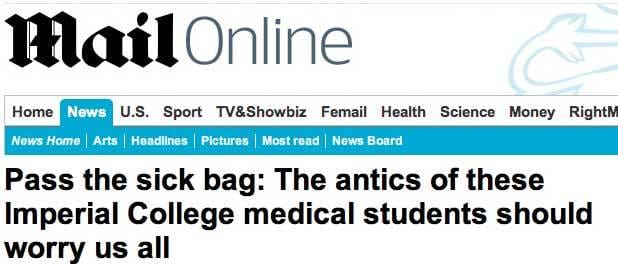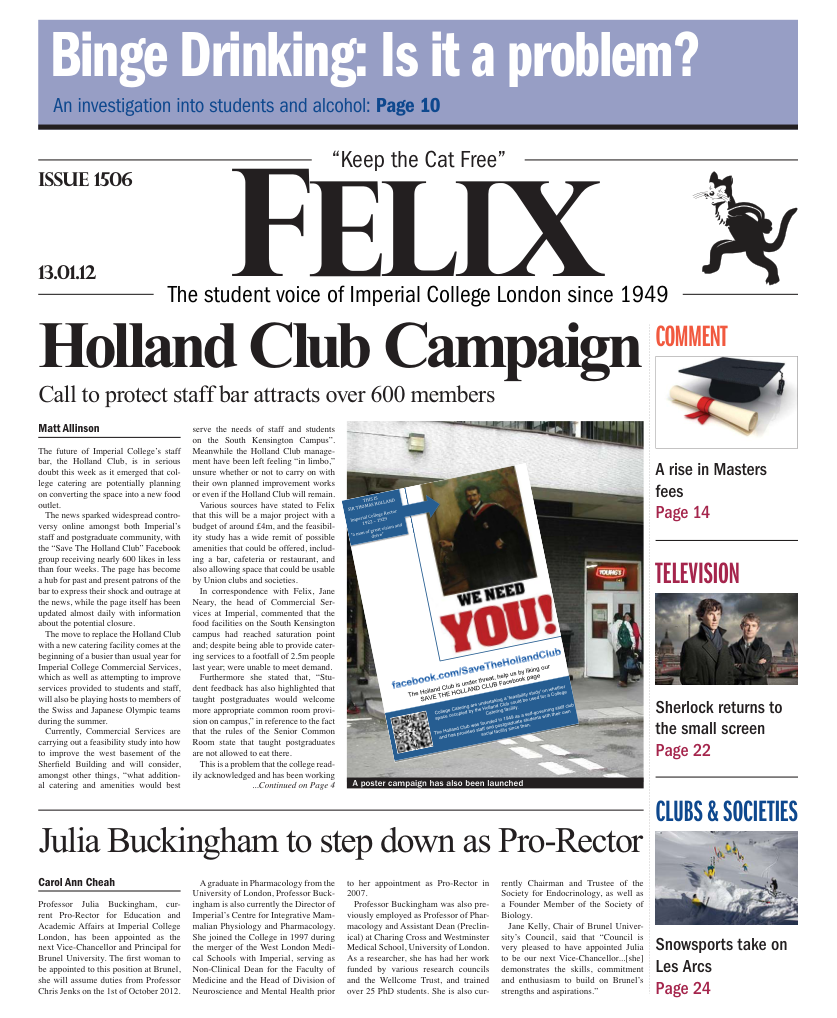An interview with Medic President Suzie Rayner
We interviewed the ICSMU President about ICSM's response to last year's Daily Mail scandal, along with Alcohol Awareness Week

Felix: How do you think the medical school has changed since this time last year (with respect to the Daily Mail article highlighting the binge-drinking culture of ICSM)? Suzie Rayner (SR): The changes made [after] the Daily Mail article last January have caused some necessary changes to bar behaviour. The changes have brought the bar in line with the ICU responsible retailing of alcohol policy which was revised earlier this year. The buckets were removed, alcohol is no longer served in jugs, it has been further highlighted that drunk people will not be served (although this was already an existing rule).
Felix: Do you agree with the opinion that excessive drinking has been ingrained into ICSM’s culture, and if so, is this something that needs to be changed? What steps have been taken to improve the issue, and how successful have they been? SR: Whilst many medical school events (across all medical schools, not just ICSM) have previously had an alcohol focus, I think that a great effort has been made over the last few years to lessen the perceived ‘essential’ nature of alcohol at these events. Whilst events for ‘non-drinkers’ have never really taken off, I think that ICSM has improved the events to cater for everyone, which is what we should be aiming for.
Felix: I would like to reiterate Dr Mirza’s point that this Awareness week is an excellent step in the right direction. What made you decide to arrange an Alcohol Awareness week, and will it become a regular thing for the medical school? SR: The thought to run an Alcohol Awareness week was initially triggered by last year’s press, and ICSMSU felt that it necessary to highlight to students the impact that alcohol (or misuse of it) can have on their careers. I hope that it has not come across as an attempt to tell people not to drink: that was never the aim. We want to provide the information that people need to allow them to make a fully informed decision. Huge thanks to Neeraj Kalra, ICSMSU Welfare Officer for leading the week, which I think has been well received.
Felix: Obviously, education is a massive component in changing the health behaviours of students, and many students may not be aware that they are at risk of seriously damaging their professional and personal lives. However, is education enough – do you not think that there needs to be more serious repercussions for students who repeatedly drink excessively? SR: I think it is crucial to separate the impact of drinking excessively in different situations. Where it is purely impacting the individual, whilst we can educate to allow them to know the damage they are doing, it is ultimately their decision (as long as they have capacity and insight). The difference comes when the individual’s alcohol consumption is affecting those around them, whether it is family, friends or patients. However, I think what is often missed is that alcohol abuse (and ultimately addiction) is also a medical problem as well as a social one, and students who have difficulties surrounding alcohol need to be helped through it, and not refuse to tell anyone for fear of repercussion. I don’t think that punitive measures are the most productive approach to alcohol misuse.
Felix: How would you respond to the possible criticism of the ICSMSU about certain members failing to lead by example by drinking responsibly? SR: The ICSMSU Exec, as an elected body, is voted for by all students and is representative of the student body. ICSMSU Exec strive to lead by example, and we are aware of the impact that alcohol can have in relation to students. A key point of alcohol awareness week is to start to impact upon the perceived drinking culture. I hope that in a few years time, as a result of campaigns run by ICSMSU amongst others, we will have managed to change this, but it will be a long process.
Felix: And finally, if a student suspects they have a drinking problem, where should be their first point of call for help? Many students could be reluctant to come forward for fear of jeopardising themselves professionally – what would you say to them? SR: Within the university, there are lots of points of call. Obviously, the ICSMSU Welfare Officer and I are always available for confidential advice. The senior welfare tutors are also an excellent source of impartial and confidential advice. The counselling service (counselling@ic.ac.uk) provide 8 sessions and referrals for longer term treatment.





